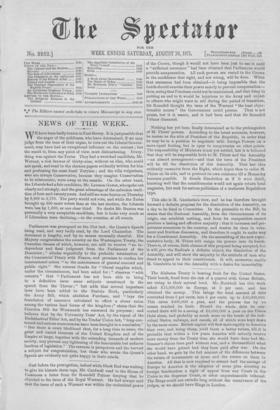Just before the prorogation, indeed while Black Rod was waiting
to give his historic three taps, Mr. Cardwell read to the House of Commons a letter from Sir Roundell Palmer denying that he objected to the issue of the Royal Warrant. He had always said that the issue of such a Warrant was within the undoubted power of the Crown, though it would not have been just to use it until a "sufficient assurance" had been obtained that Parliament would provide compensation. All such powers are vested in the Crown in the confidence that right, and not wrong, will be done. When that assurance had been obtained—it being impossible that the Lords should exercise their power merely to prevent compensation— then, seeing that Purchase could not be maintained, and that delay in putting an end to it would be injurious to the Army and unjust to officers who might want to sell during the period of transition, Sir Roundell thought the issue of the Warrant " the least objec- tionable course " the Government could pursue. That is not praise, but it is assent, and it had been said that Sir Roundell Palmer dissented.






























